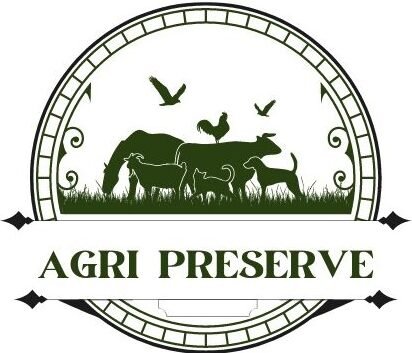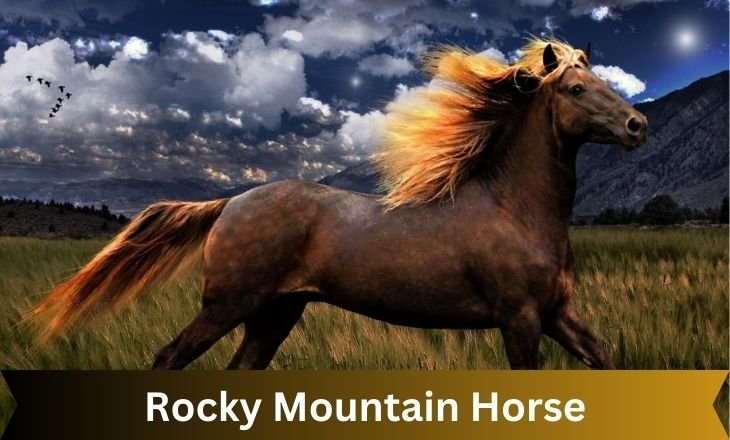The Rocky Mountain Horse is a particular horse known for being gentle and beautiful. They have a unique coat and move gracefully. They are famous worldwide for their exceptional qualities.
The history of the Mountain Horse is full of stories about strength and friendship. They are friendly and loyal, forming strong bonds with their riders. Join us to learn more about these amazing horses and their stories.
Rocky Mountain Horse History
The Mountain Horse comes from Kentucky’s Appalachian region. Fans of gaited horses bred them in the 19th century. These horses are known for their smooth gait and calm behavior. They are named after the mountains where they live.
They almost disappeared in the early 20th century because of money problems and changing tastes. But breeders saved and protected them. Today, mountain horses are famous for riding and driving, and people like to use them for pleasure riding and competitions.
Mountain Horse Weight
Rocky Mountain Horses are known for their unique build and strength, with an average weight ranging from 900 to 1,200 pounds. Maintaining a healthy weight is crucial for these horses, impacting their performance and overall well-being.
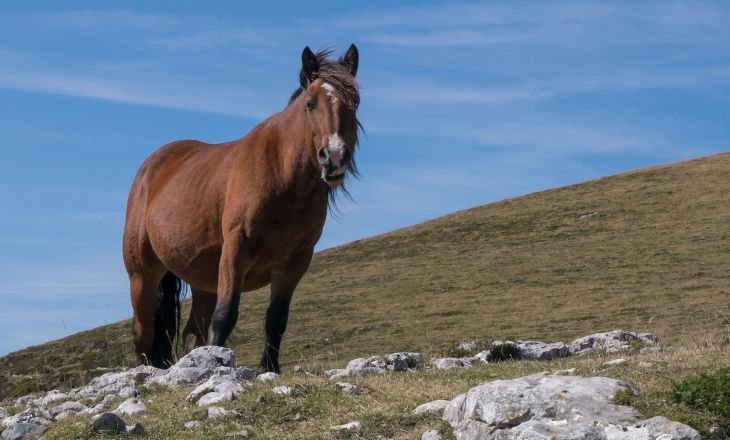
Horse size
Mountain Horses are known for their medium build, making them versatile for children and adults to ride comfortably. Their compact yet sturdy frame allows agility and endurance and is suitable for long trail rides or farm work.
Despite being smaller than other breeds, these horses are solid and robust. Riders feel secure on a Mountain Horse due to their unique combination of gracefulness and power.
Horse Height
The Mountain Horse is known for being tall and impressive, standing between 14.2 and 16 hands high, sometimes even taller. Their height helps them perform well in activities like trail riding and driving. The Mountain Horse’s tall stature makes it look striking and draws attention.
Unique Characteristics
The Mountain Horse has a smooth four-beat gait called the single-foot, making riding comfortable on rough terrain. Their brown coats, light-coloured manes, and tails make them beautiful.
These horses are friendly and gentle, making them great companions for riders of all ages and skill levels. Riders worldwide love them for their beauty, skill, and calm demeanour.
Uses Of Horse
Horses are not just for riding and racing. They help people with special needs through therapy. They also help farmers by plowing fields and moving goods. In search and rescue missions, horses use their senses to find people. They are also good at playing polo, showing their speed and coordination.
Horse Colors
Horses come in many beautiful colors, each with a unique story of genetics and heritage. Their shades and patterns make them unique and capture our hearts. A horse’s color can change as it grows, influenced by diet, environment, and season. Watching a horse’s coat evolve is like seeing a work of art change over time.
Health and Behavior
Mountain Horses need special care to stay healthy. They need the right food to avoid health problems related to their metabolism. Providing high-quality food is essential for their stomach health. Rocky Mountain Horses are friendly and enjoy human company.
They are intelligent and respond well to gentle training methods that reward good behavior. Understanding the personality of Mountain Horses can improve the relationship between owners and horses, leading to a happier bond.
Horse Disciplines
Mountain Horses are good at trail riding and show jumping because they are strong, agile, and gentle. They excel in competitive trail riding, using their smooth gait and endurance to handle rugged terrain and long distances.
Mountain Horses also perform well in Western pleasure competitions, showcasing their graceful movements and presence to judges.
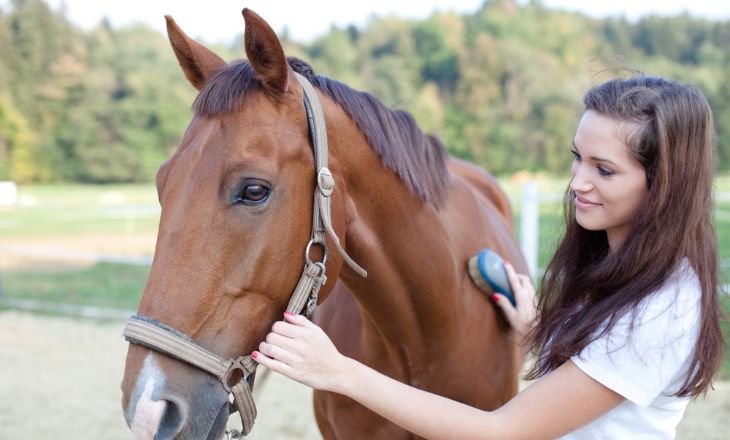
Care and Management
Rocky Mountain horses are a symbol of strength and endurance. It’s essential to focus on their unique traits when caring for them. These horses respond well to positive training methods and should have plenty of time in large pastures for their mental and physical health.
Horse Vaccinations
Vaccines are essential for keeping Rocky Mountain horses healthy. They can prevent diseases like tetanus, influenza, West Nile virus, and rabies. Giving your horse regular vaccines is essential to keep them healthy and live longer.
Dental Care Alliance
Rocky Mountain Horses are beautiful and strong. Taking care of their teeth is essential for their health and performance. Regular dental check-ups and treatments are needed to prevent tooth problems. These horses have unique teeth that keep growing and need ongoing care from a qualified dentist.
Parasite Control
Controlling parasites is essential for keeping your Rocky Mountain horse healthy. These parasites can harm your horse’s health and performance. Deworming your horse regularly is crucial to prevent issues from parasites like strongyles, tapeworms, and bots.
Create a parasite control plan with your vet that suits your horse’s needs. Regularly check for parasites and ensure the deworming plan is effective by doing fecal egg counts.
Farrier Care
Proper hoof care is essential for keeping Rocky Mountain Horses healthy. These strong horses need special attention for their hooves because they often travel on rough terrain. A skilled farrier can prevent problems like overgrown hooves, cracks, and abscesses by regularly trimming and shoeing the horses.
Regular Grooming
Owning a Rocky Mountain Horse means grooming is essential for bonding with this majestic breed. Their beautiful mane and coat need careful care to stay healthy and attractive.
Grooming your horse daily helps you bond with them and keeps them looking and feeling good. It also prevents skin problems, removes dirt, and improves circulation.
Problem Of Health
Mountain horses are known for being gentle and moving smoothly. Recently, a health problem has been affecting this breed. Metabolic disorders and obesity have been seen in these horses, worrying breeders and owners.
The inactive lifestyle of these horses at home may be causing these health issues. They need to exercise regularly and eat the right food. In addition to physical health, the mental well-being of Mountain horses is essential.
They are intelligent animals that need social interaction. Being alone or facing harsh training can make them stressed and anxious. Creating environments like their natural habitat and building positive relationships with handlers is crucial to keep them healthy and happy.
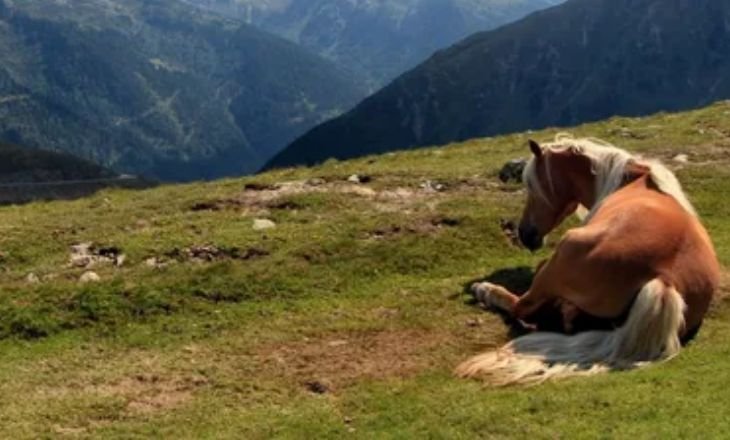
Equine Metabolic Syndrome
Rocky Mountain Horses can develop Horse Metabolic Syndrome, leading to health issues. Owners should monitor their horses’ diet and exercise to prevent or manage this condition.
Feeding the horses low-sugar, high-fiber food and allowing them to graze outdoors can be beneficial. Regular exercise is crucial for maintaining a healthy weight and improving insulin sensitivity.
Anomalies Disease
Mountain Horse Anomalies Disease is a new condition that concerns horse owners. It causes strange symptoms like sudden weight loss, tiredness, and odd walking in affected horses. This illness is unpredictable, with some horses getting worse quickly and others having mild symptoms for a long time.
Vets are studying the causes of this disease to create better treatments. One idea is that environmental factors and genetics may play a role in certain horse breeds being more at risk.
Colic In Horses
Rocky Mountain Horses are at risk of colic, a severe issue for owners and riders. These horses, known for their strength and endurance, have sensitive stomachs. Their active lifestyle and high energy levels make them prone to colic if not cared for properly.
Owners must ensure a balanced diet with lots of roughage, monitor their water intake, and exercise regularly to prevent colic.
Tetanus In Horse
People love mountain horses because they are beautiful and strong. They might face tetanus, a severe bacterial infection known as lockjaw. Tetanus can be deadly if not treated quickly.
Horse owners should know the signs of tetanus and get medical help immediately. This means keeping vaccinations current and treating wounds properly to lower the risk of infection. Taking action helps horse owners keep their Mountain Horses safe and healthy.
Pros And Cons
Conclusion
The Rocky Mountain Horse is a unique and versatile breed that has captured the hearts of many equestrians worldwide. Its smooth ambling gait and gentle temperament make it well-suited for various disciplines, including trail riding, driving, and even dressage.
The breed’s rich history and strong bloodlines give it distinct characteristics and appeal. Whether you are a seasoned rider or a newcomer to the horse world, the Rocky Mountain Horse offers an exceptional riding experience.
Add this remarkable breed to your equine family and discover the joy of owning a true American treasure.
Discover the fascinating world of Muscovy Ducks and other duck breeds. Learn about their unique characteristics and care tips here.
Frequently Asked Question
How Many Rocky Mountain Horses Are Left?
Around 25,000 Rocky Mountain horses exist worldwide, with many still in Kentucky. The breed started in the Appalachian mountains of Kentucky in the 1800s, not the Rocky Mountains.
